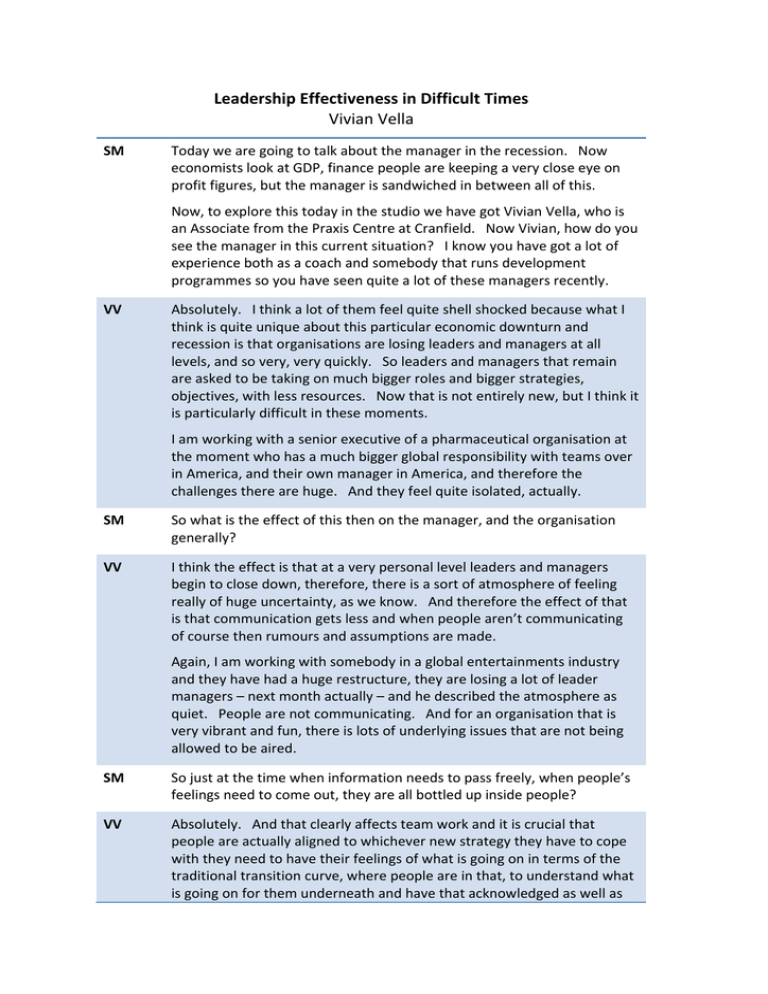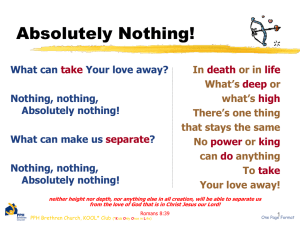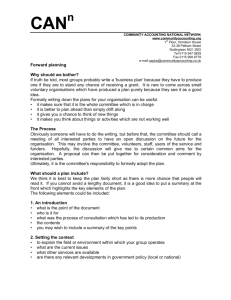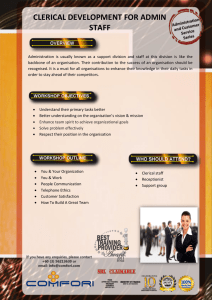Leadership Effectiveness in Difficult Times Vivian Vella
advertisement

Leadership Effectiveness in Difficult Times Vivian Vella SM Today we are going to talk about the manager in the recession. Now economists look at GDP, finance people are keeping a very close eye on profit figures, but the manager is sandwiched in between all of this. Now, to explore this today in the studio we have got Vivian Vella, who is an Associate from the Praxis Centre at Cranfield. Now Vivian, how do you see the manager in this current situation? I know you have got a lot of experience both as a coach and somebody that runs development programmes so you have seen quite a lot of these managers recently. VV Absolutely. I think a lot of them feel quite shell shocked because what I think is quite unique about this particular economic downturn and recession is that organisations are losing leaders and managers at all levels, and so very, very quickly. So leaders and managers that remain are asked to be taking on much bigger roles and bigger strategies, objectives, with less resources. Now that is not entirely new, but I think it is particularly difficult in these moments. I am working with a senior executive of a pharmaceutical organisation at the moment who has a much bigger global responsibility with teams over in America, and their own manager in America, and therefore the challenges there are huge. And they feel quite isolated, actually. SM So what is the effect of this then on the manager, and the organisation generally? VV I think the effect is that at a very personal level leaders and managers begin to close down, therefore, there is a sort of atmosphere of feeling really of huge uncertainty, as we know. And therefore the effect of that is that communication gets less and when people aren’t communicating of course then rumours and assumptions are made. Again, I am working with somebody in a global entertainments industry and they have had a huge restructure, they are losing a lot of leader managers – next month actually – and he described the atmosphere as quiet. People are not communicating. And for an organisation that is very vibrant and fun, there is lots of underlying issues that are not being allowed to be aired. SM So just at the time when information needs to pass freely, when people’s feelings need to come out, they are all bottled up inside people? VV Absolutely. And that clearly affects team work and it is crucial that people are actually aligned to whichever new strategy they have to cope with they need to have their feelings of what is going on in terms of the traditional transition curve, where people are in that, to understand what is going on for them underneath and have that acknowledged as well as Vivian Vella get on with the pragmatic stuff. SM Hardnosed managers are supposed to be able to cope with these things and one avenue is to say, now come on, pull yourself together – you are a manager, you are a leader, get on with it. Now, I don’t think that is always the answer. What ways forward have you got to suggest? VV I think people do need to stay connected and therefore it’s all very well saying get on with it – and people do, but there is a huge stress level around trying to do that on your own. I think talking things through so that people, again, have that communication with a trusted advisor within the organisation. Of course, one has to be conscious that because people are in the system there may be biases, they are obviously emotionally connected as well, and subconscious biases as well. That there are coaches and mentors that people go to internally, that they can speak more objectively with people, and people can just use them as a sounding board to understand what is going on for them – both externally and internally. SM Now I know you are an executive coach – what could an external coach do in this situation? VV Well I think what an external coach can provide is obviously being totally out of the system and therefore there is a cleanness about being objective and giving a perspective. Also it’s obviously our day job to ask the questions, to help leaders unpick their thinking and understanding not what is going on just at the surface level for them, but really unblocking things that could be stopping them to really step into their true potential in these moments when they have to be extremely resilient as leaders. And so it is something about working with them at that level really. SM And that helps solve problems, as well as get issues out on the table and feelings out on the table, I suppose? VV Yes, absolutely. I think also it gives permission for them to work with their team in that way and it relieves pressure actually. Because if people try to keep all of that bottled in, there is leakage of some sort and people can’t keep focused on what they actually have to do if they feel they have to keep hiding how they are feeling about it. SM Now I know that one of the benefits of coming on our programmes, particularly Praxis programmes, is this ability to talk to people in similar situations. Have you found that? VV Absolutely. We are working at the moment with an organisation in professional services, and they have made the very positive decision of staying with the Leadership Development Programme, and I believe for two reasons. Firstly because there is coaching support within that programme and they recognise the importance of that sort of support for Page 2 Vivian Vella their leaders; and the second point is that they are building up an alumni and therefore when people go back into the business, they have this supportive network and they are finding that absolutely valuable. SM So if I were to say to you what is a key message that you want to pass on to managers and leaders in organisations about the current situation, what would it be? VV It would be: find somebody to talk things through with. To look after themselves both physically, because as we know there is a huge connection in terms of resilience of just keeping physically fit, eating well. It’s not rocket science, but taking care of themselves and also just talking things through so that they get the mental resilience as well. Finding somebody within, or outside of the organisation to be able to do that and keep communicating. SM Some timely points, Vivian. Thank you very much. VV Thank you. Page 3



